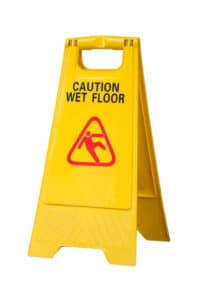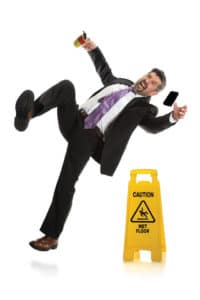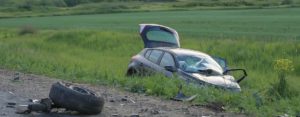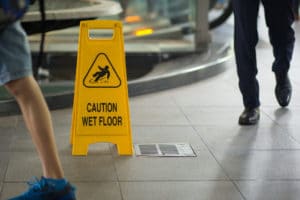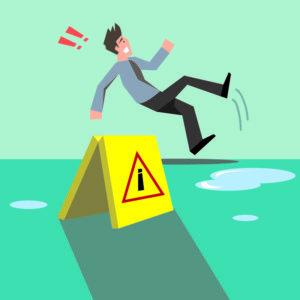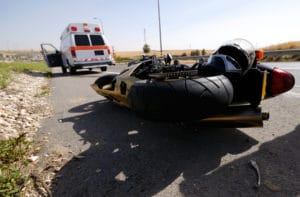
Motorcycle riders will tell you, that cars don’t respect motorcycles. While that may be true, some motorcyclists sometimes don’t respect the dangers that exist on the roads. On Sunday, April 28, at about 10 PM, a motorcycle was traveling NB on Decatur approaching the intersection with Oakey. Traveling SB on Decatur, a Ford Mustang made a left turn onto Oakey into the path of the motorcycle. The motorcycle, which was carrying two riders, hit the right front of the Mustang ejecting both people on the motorcycle.
The person driving the motorcycle was killed at the scene, and his traveling companion was taken to UMC Trauma in critical condition. The driver of the Mustang was also hurt and transported with non-life-threatening injuries. Police do not believe that either driver was impaired but do believe that speed was a factor in the accident. This was the 39th traffic death in Las Vegas this year. As to who’s at fault, that information is unclear based on the public information available. Our hearts go out to the families of those hurt and killed. It’s tragic.
Is this a problem that’s getting worse?
Unfortunately, we read all too often of motorcyclists being killed in crashes in Las Vegas. At times it’s a single vehicle accident, but many times, it due to a collision with another vehicle. The state keeps statistics of such things, and the most recent numbers, as of March 2019, show that there have been 8 motorcycle accident deaths in Clark County, which is one less than the same period last year. We’d like to think that’s an improvement, but the year is young. Perhaps this accident illustrates how much more vulnerable people on motorcycles are in relation to passengers in a car.
70% of motorcycle accidents occur at intersections
We have been reporting on this topic regularly on this blog. Regardless of who’s at fault, there are some facts of life that motorcyclists need to respect before getting on their bikes. As far back as 2013 we offered suggestions to bikers to make their experience safer taking into account the lack of physical protection motorcycle riders have. We repeat those suggestions here with an emphasis on item 5:
- Take a motorcycle training course. As Honda’s Jon Seidel states: “There is nothing we could say or advise more than to go find a Motorcycle Safety Foundation (MSF) riding course in your area. That’s critical, absolutely critical.” The MSF is the foremost national organization promoting motorcycle safety. They have developed courses for riders ranging from beginner to advanced riding skills. Costs range from free to about $350, and some dealerships provide such training as part of the purchase of a new bike. Course completion may provide eligibility for discounts on insurance, and some states give credit toward obtaining the motorcycle endorsement on your driver’s license. Talk to your dealership to find out about MSF or other like training organizations.
- Build your skills. Motorcycle riding is more than driving a motorcycle. It is a completely different skill set. Balance and coordination are required to ride a motorcycle to a much greater degree than driving. Just the act of shifting gears takes right hand/left hand/left foot coordination, and braking requires right hand/right foot coordination. Especially if you’re a new rider, take time to learn and build the muscle memory it takes to ride a bike. Stopping requires more than pushing a single pedal as in a car. An emergency stop requires a large amount of skill to successfully execute. Don’t ride in a manner more advanced than your skill set can support.
- Be Defensive. Riders…to be blunt, by its very nature your vehicle is more dangerous than a car. If you wish to be safe on your bike, stay out of blind spots, and make sure you can be seen by drivers of cars and trucks. Unfortunately, roads are built predominately for cars, there are more cars on the road, and you need to accept the fact – when you’re on a motorcycle with cars and trucks on the road – you’re in a dangerous environment. Drivers are enclosed with either wind noise, or soundproofing (if the windows are closed) they can’t hear you coming and may not see you, and if the driver is texting or talking on the phone, the driver may not be paying attention. When, or if the car changes lanes and you’re in the blind spot, you may be completely within your rights, but you’re going to lose that contest. Accept this as a condition of the road, and ride accordingly.
- Wear a helmet. Riders without helmets are 40 times more likely to suffer a fatal head injury, and three times more likely to suffer brain injuries than those with helmets. Full face helmets with a DOT certification sticker is the best choice. Helmets today are light and comfortable. If you want to protect yourself, wear a helmet.
- Be alert at intersections. Nearly 70% of motorcycle/vehicle collisions occur at intersections. Vehicles may turn in front of you or pull out from a side driveway or street. Slow down, check traffic, check traffic again, and be prepared to react quickly.
- Assume you are invisible to other motorists and operate your motorcycle accordingly. Position yourself to be seen. Avoid the “No Zone” or blind spots on the right and left side of cars about even with and behind the rear wheels of the car.
The Richard Harris Law Firm represents those injured in motorcycle accidents
If you or a family member has been hurt or killed on a motorcycle, by a driver who was negligent, call us today to discuss your case. We will see to it, that your settlement is fair and just. Our attorneys have to experience and knowledge of the law to get you the best settlement possible. Call us today at (702) 444-4444.
Learn More:
https://news3lv.com/news/local/one-dead-one-critical-in-motorcycle-crash-near-decatur-charleston
https://www.ktnv.com/news/1-dead-1-hospitalized-after-vegas-crash-involving-motorcycle





















